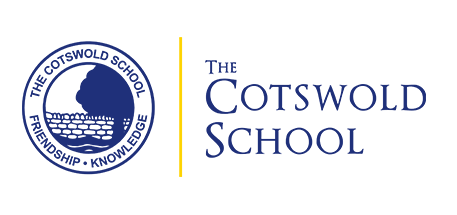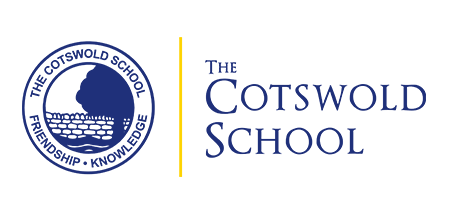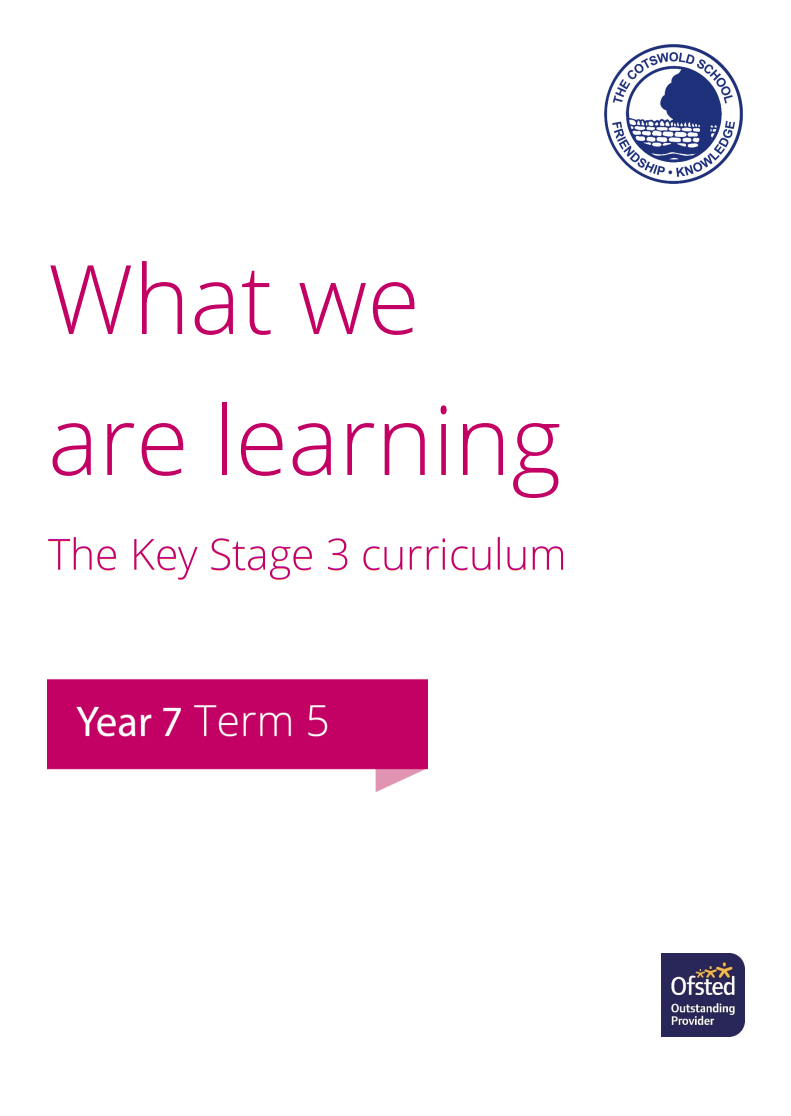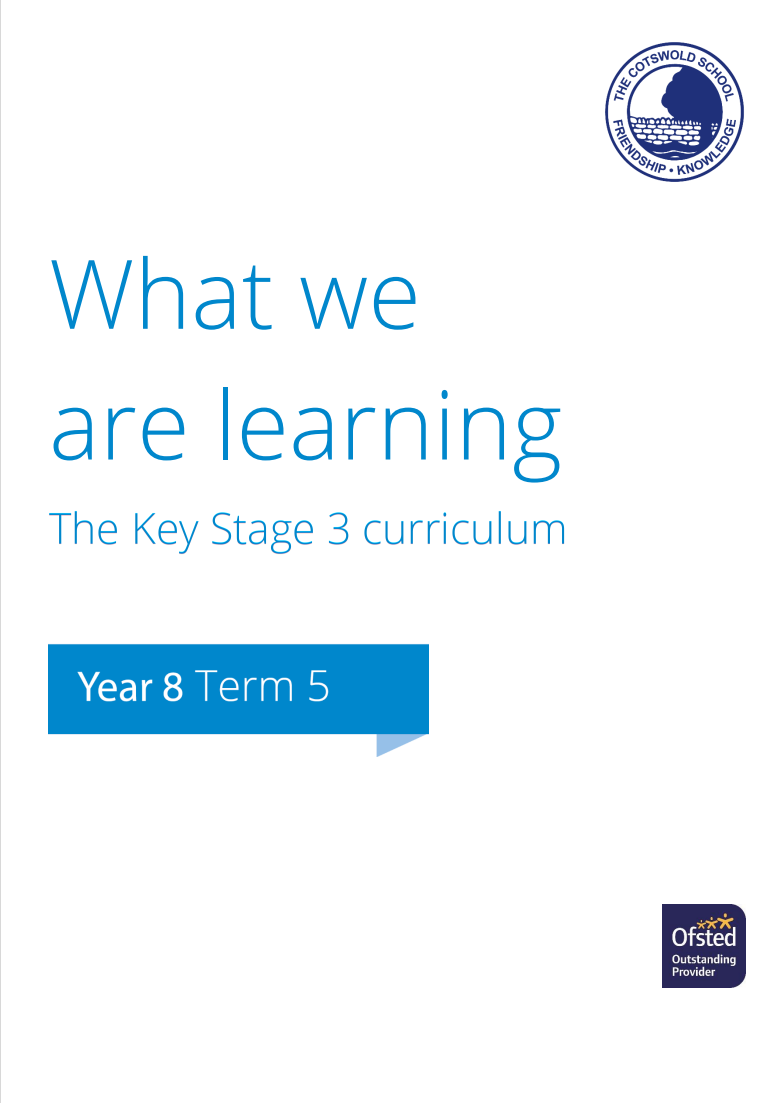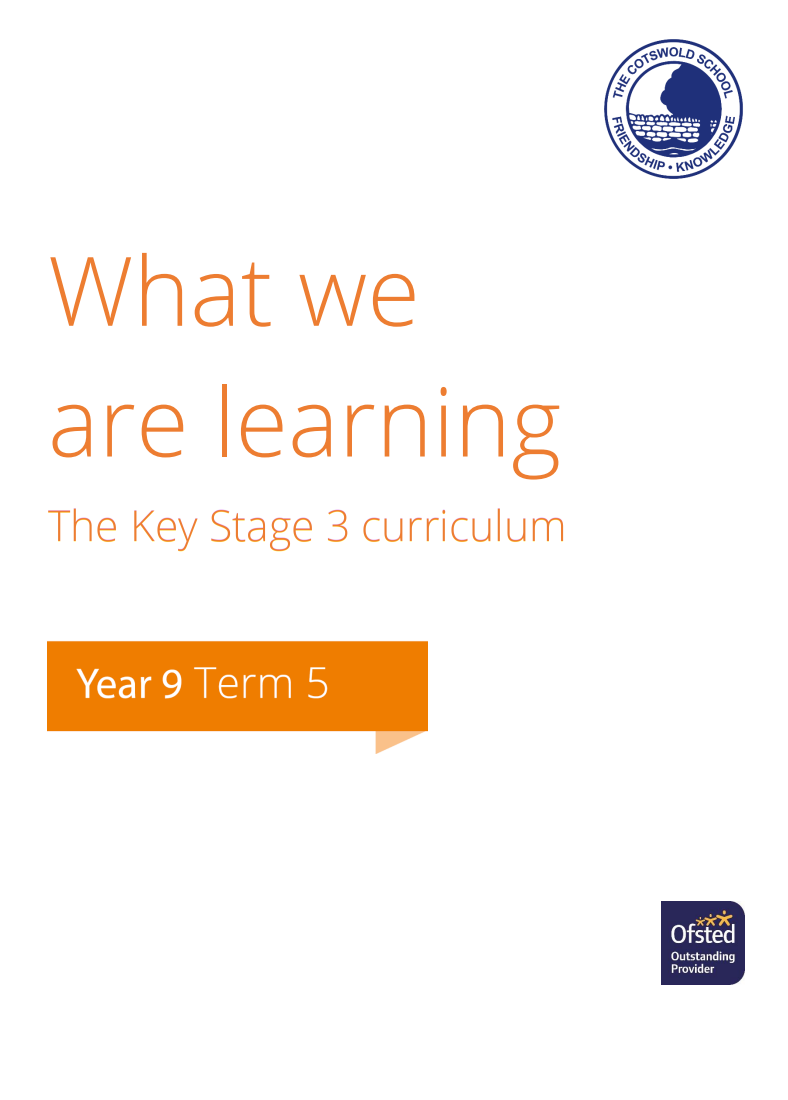What we are learning
Click below to find out ‘what we are learning’ in each of the Key Stage 3 year groups each term. There’s an overview of each subject, so children and families can understand and discuss the themes that we learn about and how our curriculum content evolves throughout students school career.
Curriculum key words
Learning in all subjects at secondary school requires you to have a strong vocabulary. Key words will be taught to you in all subjects and you will need to become familiar with them to fully understand the topics being covered.
We have created a quizlet.com account to share with you all the key words and to help you learn and memorise them. This can be found here: quizlet.com/The_Cotswold_School/sets
Students will need a free Quizlet account to access these resources. There is no need to sign up for the premium version as long as they have joined a ‘class’. Many students will already have a Quizlet account as they have likely used this in the Languages learning.
If you need to create a new account, our suggestions are as follows:
- Use your school email address. This means we can reset passwords if needed. Do not use a parent email address, even if Quizlet suggests this.
- Do not use your real name as your username, but do use a name that can be identified by your teachers. For example, your first name and initial of your surname.
- Use a sensible password. You could use you school password, but remember do not share this with anyone.
To access all the features on Quizlet you will need to join our ‘classes’ on Quizlet. On each class page there is a button that says ‘Request to join class’. Links to these have also been sent on satchel for each year group. Please ask Mr Edwards if you are unsure.
Inside Quizlet you will find various options:
- Flashcards: Use these for first learning and quizzing yourself. If you click the ‘star’ on any card it will be saved as one that you want to look at again later.
- Learn: This helps you to remember the key words. Learn mode can track which ones you know well and which ones you still need to learn. Go into ‘options’ and try ‘SPELL MODE’ or ‘Write Mode’ for extra options.
- Test: When you’re ready, try a quick test. You can decide if you want true or false, multiple choice, matching or written questions. We can’t see your test results.
- Match: This is a game to match words with their definitions. How quickly can you complete it?
- Q-Chat: This is an AI powered tool to teach and quiz you on the key words. It is really powerful. Try the different activities, ‘Teach me’, ‘Quiz me’, ‘Apply my knowledge’ or ‘Ask a question’.
- Print: If you click the three dots at the bottom right-hand corner you can select ‘Print’. This is useful if you find a paper copy of the words useful. Perhaps for your folder or exercise book or perhaps to pin up on the kitchen fridge?
There is also a very useful app for Quizlet that you might be able to download and use.
Quizlet is great, but to really learn your key words, remember to also write down the words and use them in real sentences. Try to look at them little and often.
Curriculum overview
The Cotswold School has at its heart the values of ‘friendship and knowledge’. Our vision is that, by the time they leave our school, every child has gained the knowledge they need to succeed in their lives.
The accumulation of knowledge of a rich and broad curriculum– by all students – is at the centre of what we do. From their first day in Year 7, we want students to discover a love for learning and knowledge that will help them select their GCSE courses and progress successfully throughout their school life and into the future. We can offer a variety of pathways as each student progresses through the school but always ensure that doors are open to everyone to enjoy our full and well developed curriculum offering.
Starting with the national curriculum, our expert subject leaders carefully consider what a student should know at each stage of their progression in school. In some areas, they have gone beyond the content of the national curriculum to give students the knowledge they need to address life in modern Britain.
Our curriculum is fully mapped to ensure that subjects can draw out inter-related content and that teachers across the school understand the wider picture of what each student is learning.
We have carefully sequenced the chosen content, ensuring students build on their previous knowledge and are clear about what they are expected to achieve. We use assessment to ensure the correct components of knowledge are in place before progression.
For more information about each subject area, please see individual subject pages.
It is a curriculum based on parity of opportunity with every effort made to identify and address under-achievement. A core value is to ensure that disadvantaged pupils (Pupil Premium and SEND) are given an outstanding education and the support they need to make progress at least in line with their peers.
Our curriculum is designed to be inspiring and to build curiosity. It is engaging and relevant to the modern world in which we live. We have four main strands to our curriculum:
- Our own identity
- Our place in society
- Our world around us
- Our skills and future lives
We hope to develop independence and confidence whilst helping students to develop their own approaches to learning and development. Critical thinking and problem solving are inherent in many of our subjects and approaches. Ours is also a curriculum that has the real world and future employability at its heart. As our school mission statement says, we are “Creating Brilliant Futures”.
Personal, Social, Health and Economic (PSHE) and Spiritual, Moral, Social and Cultural (SMSC)
Beyond the academic curriculum lies an extensive, well planned and mapped provision for developing each student as an individual. Our PSHE and SMSC is taught both explicitly in designated lesson time and across the curriculum where it is woven into the subjects being taught. Understanding and respecting British values is a core mission for us as a school.
We also believe in the huge importance of promoting diversity and better understanding of the world. We are proud of our International Schools Award and the work we have done to make sure each department area helps to develop a wide angled view of their subject and the world around us.
We keep our balanced, comprehensive curriculum under constant review, using cycles of self-evaluation and development to ensure our students benefit from the best opportunities available, whilst preserving our commitment to rigorous academic values.
Extensive Extra-Curricular Programme
An extensive extra-curricular programme of trips, clubs, sports and additional learning activities – from the Spanish exchange to Debating Club – further enriches the learning we offer. It is our aim that these opportunities are available to all as they play such a key element in each student’s personal development whilst at The Cotswold School. For more details please click here.
Careers Information
Our careers information, advice and guidance programmes help students investigate careers when deciding which subjects they will choose to study in Years 10, 11 and beyond. For more information click here.
Years 7-9 (Key Stage 3)
In Years 7- 9 (Key Stage 3) pupils take the following subjects:
Art; Computing; Design and Technology; Drama; English; French; Geography; German; History; Mathematics; Music; Philosophy, Beliefs and Ethics; Physical Education; Science and Spanish.
Students all experience the same subjects in Years 7 and 8. In Year 9 they can choose which Modern Foreign Language (MFL) and Design and Technology subjects they want to concentrate on.
In certain subjects, students are grouped by ability (for example, in Maths) which is calculated using primary school data. These sets are frequently reviewed and further Year 7 testing can result in some pupils moving classes.
Most students study two MFL and then go on to study at least one MFL at GCSE. A few students will study just one MFL in Key Stage 3 with the aim that they can develop better confidence and ability so that they can continue to study that language up to GCSE.
Years 10 and 11 (Key Stage 4)
In Years 10 and 11, pupils follow a varied programme of GCSE courses, some of which are chosen in consultation with their parents and the school. During the spring term of Year 9, we invite parents to an Options Evening to fully explain our course options.
Our options system at GCSE and A level is student-centred, which means students have a free choice, under the guidance of our pastoral and subject teams. We believe students have an excellent selection from a wide variety of traditional GCSE subjects and newer vocational courses. We use evidence from students’ achievements and parental feedback to evaluate the balance of subjects on offer at this stage.
Certain GCSE subjects are compulsory during these two years. These are:
English Language; English Literature; Mathematics; Science (Double Award); a Humanities subject and Modern Foreign Language (for some students).
Option courses include:
Art; Business Studies (BTEC and GCSE); Computing; Drama; Food; French; Geography; German; Childcare; History; ICT; Music; Physical Education (GCSE and BTEC); Product Design; Religious Studies; Spanish; Textiles and Triple Science.
Students in Years 10 and 11 are organised into teaching groups for the core subjects: English, Mathematics, Science and Humanities. Some core subjects use sets and others are mixed ability. Students also have a choice of up to three other subjects and are taught in mixed ability groups. The Learning Support Department help students with particular educational needs both within lessons and outside the classroom on an individual basis.
Independent Learning
The school believes that independent learning outside of the classroom (homework) is an important aid to good progress and we set pupils relevant work that consolidates, develops and extends the learning in lessons. This work may take a variety of forms. There is no set timetable for the setting of independent learning. All work is recorded by staff on Satchel:One and pupils may also choose to use a traditional planner/diary.
Each parent or carer receives instructions on how to use Satchel:One, but if you have any questions, please do not hesitate to contact us. From time to time pupils will also be directed towards optional extension opportunities which they may find interesting.
Sixth Form (Key Stage 5)
Students in our Sixth Form study a wide range of Level 3 courses. Entry requirements vary from course to course (details of subject entry requirements can be found on the Sixth Form section of our website) with consideration of the individual student’s strengths, interests and aspirations helping to inform any decision. Our Key Stage 5 programme includes additional courses to help prepare for university – such as Critical Thinking and Core Mathematics – and extensive support for the next steps, including our Higher Education and Apprenticeships days; practice interviews; subject ambassadorships and work experience opportunities.
Applications are welcome following the Sixth Form Open Evening, held in mid-November, along with ‘taster lessons’ to find out about subjects that students have not experienced before. Interviews with a senior leader are carried out in the weeks following this.
AS and A Level Subjects:
Art; Biology; Business; Chemistry; Computer Science; Design & Technology (Product Design); Drama and Theatre; Economics; English Literature; English Language; French; Geography; German; History; Mathematics; Further Mathematics; Media Studies; Music; Physics; Psychology; Religious Studies; Sociology; Spanish, Textiles.
Level 3 Vocational Subjects:
Business (Double Award); Health & Social Care (Double Award); Sport (Double Award; Extended Project
